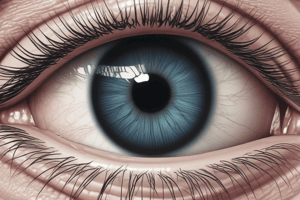Podcast
Questions and Answers
What is Evidence Based Clinical Reasoning?
What is Evidence Based Clinical Reasoning?
- The use of personal experiences in making decisions about patient care
- The use of intuition in making decisions about patient care
- The conscientious use of current best evidence in making decisions about individual patient care (correct)
- The use of traditional beliefs in making decisions about patient care
What is the goal of clinical reasoning?
What is the goal of clinical reasoning?
- To evaluate the symptoms and signs
- To reach a diagnosis
- To develop an appropriate management plan
- All of the above (correct)
What is clinical reasoning?
What is clinical reasoning?
- The use of intuition to guide the acquisition of additional information
- The use of only initial patient information to form a case representation of the problem
- The physician's integration of their own knowledge with initial patient information to form a case representation of the problem (correct)
- The acquisition of additional information without revising the problem representation
What should a student learn in clinical reasoning?
What should a student learn in clinical reasoning?
What does clinical reasoning guide the acquisition of?
What does clinical reasoning guide the acquisition of?
What is the physician's use of problem representation based on?
What is the physician's use of problem representation based on?
What should a physician do based on the acquired information in clinical reasoning?
What should a physician do based on the acquired information in clinical reasoning?
What should a physician repeat until reaching a threshold of confidence in clinical reasoning?
What should a physician repeat until reaching a threshold of confidence in clinical reasoning?
What does clinical reasoning guide the physician to support in the end?
What does clinical reasoning guide the physician to support in the end?
What is emphasized when examining a patient in clinical reasoning?
What is emphasized when examining a patient in clinical reasoning?
What factors can influence physicians' early diagnostic impressions?
What factors can influence physicians' early diagnostic impressions?
When does the analytical approach in diagnosis kick in?
When does the analytical approach in diagnosis kick in?
What is emphasized in the development of genuine expertise?
What is emphasized in the development of genuine expertise?
What is the purpose of 'deliberate practice' in developing expertise?
What is the purpose of 'deliberate practice' in developing expertise?
What should be further tested for in a patient with a third Subconjunctival Hemorrhage in 3 months?
What should be further tested for in a patient with a third Subconjunctival Hemorrhage in 3 months?
What is a possible differential diagnosis for a red eye according to the text?
What is a possible differential diagnosis for a red eye according to the text?
What does the analytical approach in diagnosis involve when uncertainty is high?
What does the analytical approach in diagnosis involve when uncertainty is high?
What is a characteristic of the intuitive approach in diagnosis?
What is a characteristic of the intuitive approach in diagnosis?
What is emphasized as necessary for the development of genuine expertise?
What is emphasized as necessary for the development of genuine expertise?
What influences physicians' early diagnostic impressions?
What influences physicians' early diagnostic impressions?
What are the 3 evidence-based models of clinical decision making mentioned in the text?
What are the 3 evidence-based models of clinical decision making mentioned in the text?
What does algorithmic reasoning involve?
What does algorithmic reasoning involve?
Why may pattern recognition not be efficient for some conditions?
Why may pattern recognition not be efficient for some conditions?
What is meant by 'differential diagnosis'?
What is meant by 'differential diagnosis'?
What are the 5 stages of clinical reasoning mentioned in the text?
What are the 5 stages of clinical reasoning mentioned in the text?
What is the first stage of clinical reasoning according to the text?
What is the first stage of clinical reasoning according to the text?
How are hypotheses generated in clinical reasoning?
How are hypotheses generated in clinical reasoning?
What happens after obtaining clinical information in clinical reasoning?
What happens after obtaining clinical information in clinical reasoning?
What factors contribute to a doctor's clinical decision-making skills?
What factors contribute to a doctor's clinical decision-making skills?
What is the hypothetico-deductive method in clinical decision making?
What is the hypothetico-deductive method in clinical decision making?
Flashcards are hidden until you start studying
Study Notes
Clinical Decision Making and Diagnostic Reasoning in Ophthalmology
- There are 3 evidence-based models of clinical decision making: algorithmic reasoning, pattern recognition, and hypothetico-deductive method.
- Algorithmic reasoning involves a sequence of questions and logical methods to diagnose conditions, but not every patient fits into the algorithm.
- Pattern recognition relies on learned patterns of diseases and visual cues, but may not be efficient for conditions with less distinctive features.
- The hypothetico-deductive method involves generating multiple working hypotheses and continually reinforcing, rejecting, or generating new ones until a final diagnosis is reached.
- Differential diagnosis refers to a doctor's list of likely hypotheses and the process of gathering clinical information to determine the actual diagnosis.
- Clinical reasoning involves 5 stages: problem identification, hypothesis generation, hypothesis testing, hypothesis review, and developing a management plan.
- Problem identification starts with the case history and understanding the chief complaint to develop hypotheses.
- Hypotheses are generated based on patient profile, doctor's knowledge, and epidemiology.
- Hypotheses are tested through further inquiry and tests during the examination sequence.
- After obtaining clinical information, a diagnosis is made, and some hypotheses are rejected, added, or reinforced.
- Depending on the diagnosis and other factors, a management plan is developed, considering possible treatment options and patient's background.
- Factors contributing to a doctor's clinical decision-making skills include knowledge base, reasoning skills, clinical experience, professional style, attitudes, beliefs, and demeanor with patients.
Studying That Suits You
Use AI to generate personalized quizzes and flashcards to suit your learning preferences.



